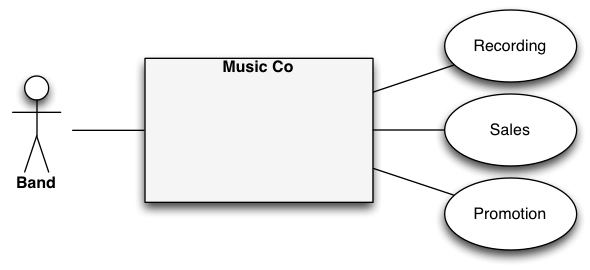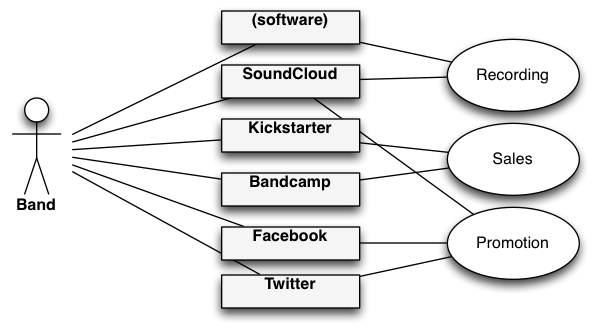I recently got a mail inviting me to the soft launch of a new feature of Bandcamp. This got me visiting their features list , which is much longer than it used to be.
Twentieth-Century Model
In a sense recorded music has always been crowd-funded: Cliff Richard and Madonna and the rest are paid out of money paid for records and merchandise by thousands or millions of fans of their music. The difference is that in the past the machinery needed to sell a record was packaged up as the Music Industry, large companies supplying services too expensive for a new act to fund themselves:
- The means to make recordings: studio time, sound engineers and other production staff, coaching, etc.
- Manufacture, distribution, and sale of the records, cassettes, and CDs.
- Promotion, marketing, advertising, payola.
These companies also do other things, but I think these are the main ones essential to music production.
Century 21
Suppose as they fear the big Music Industry companies all die because of free-loaders copying music without paying for it. Could a bottom-up, artisan music industry emerge from the ashes?

Modern technology makes equipment capable of producing a recording so much cheaper that it is something that many people can do themselves or in smaller studios, and a band can do a certain amount of promotion on-line via Facebook or their own web site. But what about the distribution and selling of records? How do you get paid for your work? Can you make a living from it?
There are four main way to fund creative efforts on-line:
- Advertising;
- Tip jars and micro-payments, like Flattr or an Amazon or PayPal donate button;
- Crowd-sourcing finance for projects, like Kickstarter; and
- Selling tracks and merchandise.
Alas! much as I would like them to, I don’t see micro-payments solving the problem: most people just cannot be bothered to jump through the hoops to set up a payment account. Kickstarter (and similar sites) help fund the up-front costs of production, but you need to be able to make sales afterwards to create an ongoing business. There are several ways to sell tracks on-line; my favourite is Bandcamp.
The Bandcamp Model
Bandcamp’s aim is to help artists sell their music and merch directly to their fans, and to help fans discover new music and directly support the artists who make it. They take care of the technical details of making high- quality downloads in a choice of formats with working metatdata.
They avoid one of the bear-traps of web-application design and do not attempt to become a generic music portal or store; instead they assume the artists have their own web site (or can set one up on Squarespace or whatever blogging site is currently fashionable), and concentrate on supplying an embeddable music player that the site designer can easily embed like this:
This links to a music catalogue that can be themed to approximately match the rest of your site. You can add merch (like vinyl or tee-shirts) to your Bandcamp catalogue, removing the need to run a second online shop. If you don’t want to run a separate site, you can embed your Bandcamp-powered catalogue in your band’s page on Facebook. So, at last! Facebook is the new Myspace.
Is Bandcamp the Future?
Bandcamp have the best implementation of the concept of selling music tracks and albums online I have yet seen. I am not sure exactly how much people pay for albums on average, but it after plucking some figures out of the air and multiplying them together, it seems to me that if you can sell 2000 or so copies of an album per band member then you can afford to pay each other minimum wage. This is more sales than a local band would expect but does not seem completely impossible given talent and a decent break.
Considered as a business there is a lot more to the equation than producing the recording and selling it: promotion, touring, hotel repair bills, platform shoes, etc., and the issue of risk: you might not be able to persuade a bank manager to bank on your musical talent. The flip side is that the on- ramp for Bandcamp is fairly shallow: you can start small and see whether you get enough sales to eventually go full-time.
Remember the old model, where the organization of your musical career was handled by one organization, who insulated you from the details of manufacture and distribution in exchange for a hefty chunk of your earnings:
In the new model you organize your own recordings, promote them on Twitter, Facebook and SoundCloud, sell them via Kickstarter and Bandcamp, and generally take care of a lot of the non-music-making parts of being a musician yourself.
The upside of dis-intermediation is you get more control over your work. And as music-career-management services emerge to relieve artists of the burden of leading a double life as entrepreneurs, artists will be in a stronger position than when a few titanic players controlled the industry.
I am probably biassed since I like buying music from Bandcamp more than from bigger stores like iTunes or Amazon, so I want it to do well. But I think that while not that many people will get rich off selling recordings in the future, Bandcamp will at least be part of the solution for getting artists paid for their work.

